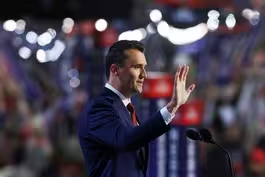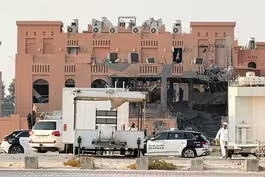
Putin is mocking Trump, Polish foreign minister says
Clip: 9/10/2025 | 8m 15sVideo has Closed Captions
'Putin is mocking' Trump, Polish foreign minister says after Russian drone incursion
It was an ominous series of firsts for the world’s largest military alliance. For the first time in NATO history, alliance airplanes engaged enemy targets in allied airspace, and for the first time since Russia’s full-scale war in Ukraine, NATO opened fire on Russian drones. Nick Schifrin discussed more with Poland's foreign minister.
Problems playing video? | Closed Captioning Feedback
Problems playing video? | Closed Captioning Feedback
Major corporate funding for the PBS News Hour is provided by BDO, BNSF, Consumer Cellular, American Cruise Lines, and Raymond James. Funding for the PBS NewsHour Weekend is provided by...

Putin is mocking Trump, Polish foreign minister says
Clip: 9/10/2025 | 8m 15sVideo has Closed Captions
It was an ominous series of firsts for the world’s largest military alliance. For the first time in NATO history, alliance airplanes engaged enemy targets in allied airspace, and for the first time since Russia’s full-scale war in Ukraine, NATO opened fire on Russian drones. Nick Schifrin discussed more with Poland's foreign minister.
Problems playing video? | Closed Captioning Feedback
How to Watch PBS News Hour
PBS News Hour is available to stream on pbs.org and the free PBS App, available on iPhone, Apple TV, Android TV, Android smartphones, Amazon Fire TV, Amazon Fire Tablet, Roku, Samsung Smart TV, and Vizio.
Providing Support for PBS.org
Learn Moreabout PBS online sponsorshipGEOFF BENNETT: It was an ominous series of milestones today for the world's largest military alliance.
For the first time in NATO history, alliance airplanes engaged enemy targets in allied airspace.
And for the first time since Russia's full-scale war in Ukraine, NATO opened fire on Russian drones.
Nick Schifrin speaks to the foreign minister of NATO member Poland, where the attack took place, and reports on a day that rattled the alliance.
NICK SCHIFRIN: In Eastern Poland today, the aftermath of a Russian attack, a house destroyed by a shot-down Russian drone, its remnants a reminder of how the war in Ukraine can escalate.
Polish officials say 19 drones crossed into Poland on the alliance's eastern flank, fired not only from Russia, but also from Belarus.
European officials tell "PBS News Hour" the drones flew as far as 300 miles into Poland and the attack lasted seven hours.
It comes at a precarious moment for Ukraine.
Russia continues to achieve small territorial gains, but at enormous cost to its soldiers.
President Trump is vowing to impose economic pressure on Russia, but wants it coordinated with Europe.
Today, President Trump posted: "What's with Russia violating Poland's airspace with drones?
Here we go!"
And, today, Europe says it needs better defenses from those Russian drones, including its own wall of drones on its eastern flank.
Earlier today, I spoke to Poland's foreign minister, Radek Sikorski.
Radek Sikorski, thank you very much.
Welcome back to the "News Hour."
We have seen incursions in the past since Russia's full-scale invasion of Ukraine, but this seems to be a larger scale and deeper into Poland.
So how significant is this?
RADOSLAW SIKORSKI, Polish Foreign Minister: As you say, we have had incursions before, both by drones and by cruise missiles.
One of them actually landed 10 kilometers from my house in Western Poland.
But this is different, A, because there were 19 breaches of our airspace.
And, B, the operation lasted for seven hours.
It started before midnight, and we shot down the last drone at 6:30 a.m.
So it's hard to believe that it was accidental.
NICK SCHIFRIN: A senior European official tells me that one of these drones flew as deep as 300 miles, and also that they came not only from Russia, but from Belarus.
Does that indicate to you that this was purposeful, this was intentional?
RADOSLAW SIKORSKI: Indeed.
If it was just an accident resulting from the indiscriminate bombing of Ukraine, you would expect them to come from Ukraine.
NICK SCHIFRIN: Talk about what you believe Moscow intended by this attack.
Were they testing Polish NATO defenses?
Were they perhaps watching how cohesive a NATO response would be?
RADOSLAW SIKORSKI: The Russians are about to conduct a major cyclical exercise at our borders called Zapad.
So, yes, they could have been testing us, but if so, the test, as far as we're concerned, was positive for us.
We shot down the drones.
NICK SCHIFRIN: So what do you think they intended by doing this?
RADOSLAW SIKORSKI: Perhaps intimidation, perhaps trying to affect our information space.
It is -- the kinetic operation is being accompanied with a huge disinformation campaign.
NICK SCHIFRIN: The fact that one of these drones flew more than 300 miles, the fact that, as you say, this lasted for seven hours, do you think the Polish and NATO response was sufficient?
How short is NATO, how short is Poland of air defense and that drone wall you're calling for?
RADOSLAW SIKORSKI: It was effective, but F-16s and F-35s are not the most cost-effective ways of dealing with these swarms of drones.
We need to have a layered defense against this new Russian technique.
NICK SCHIFRIN: And that doesn't exist today?
RADOSLAW SIKORSKI: It needs to be created as a result of lessons learned from the Russian aggression against Ukraine.
NICK SCHIFRIN: Let's zoom out a little bit and talk about the West's willingness and ability to punish Moscow not only for today, but overall.
The European Commission is drafting a new sanctions package that would hit Russian energy revenues and the military industrial complex.
But a senior European official tells me that, this week, President Trump called into a meeting between European and American officials trying to coordinate some of these sanctions on Russia and demanded that Europe impose 100 percent secondary sanctions on China and India for buying Russian energy products.
Is that a step that Europe is willing to take?
RADOSLAW SIKORSKI: Well, President Trump also called on all of Europe to stop importing Russian oil.
The two countries that are doing that are Slovakia and in particular Hungary, which is run by a populist government.
So we hope that President Trump makes the call to Budapest and asks Viktor Orban to stop importing Russian oil and import it from other directions.
I think it's high time that President Trump should see that Putin is mocking him.
Instead of a cease-fire that was supposed to happen before the Alaska summit and serious peace talks, Putin is sending more and more droves, first at Ukraine and now at NATO.
So I hope that, at the end of this process, we have a series of coordinated moves to make President Putin realize that this exotic project of rebuilding the Russian empire will not stand.
NICK SCHIFRIN: President Trump has threatened sanctions on Russia before.
He has not followed through, although he has imposed secondary sanctions on India.
Bottom line, do you have faith that the United States is ready to impose economic punishment on Russia?
RADOSLAW SIKORSKI: We respect peace efforts.
We all want, as neighbors of Ukraine and Russia, to see a peace restored.
But we believe that Putin only answers to the most forceful actions and that Putin has been taking advantage of President Trump's goodwill for too long.
NICK SCHIFRIN: So, given the military pressure that you are trying to help Ukraine impose on Russia, given this economic pressure that we're talking about, do you believe that that combined really could convince Vladimir Putin to stop the war in Ukraine?
RADOSLAW SIKORSKI: Yes, I do, because this war will not end the way Second World War ended, with one party walking into the capital of the other.
It's much more likely to end by one side losing the resources to continue it.
And the Russian economy is already suffering and Russia is still receiving too much income from oil and gas being exported either by means of the shadow fleet or by means of pipelines to Hungary and Slovakia, for example.
NICK SCHIFRIN: And on the military pressure, Europe, of course, is purchasing American weapons to send you Ukraine after President Trump authorized that.
But the Trump administration has restricted the use of some Western weapons to be fired into Russia.
How important is it that that restriction get removed?
RADOSLAW SIKORSKI: Well, I agree with President Trump when he said that you cannot win a war by not attacking enemy territory.
And the Ukrainians have been very successful both at sea and at attacking Russian oil refineries.
There are now gas shortages in Russia, and success should be reinforced.
These are legitimate military targets.
The gas is used to power the Russian war machine.
And I'm sure American help in taking out such targets would be appreciated.
NICK SCHIFRIN: Radek Sikorski, thank you very much.
RADOSLAW SIKORSKI: My pleasure.
Thank you.
Book explores how misogyny is replicated in AI and new tech
Video has Closed Captions
Clip: 9/10/2025 | 7m 33s | 'The New Age of Sexism' explores how misogyny is replicated in AI and emerging tech (7m 33s)
Conservative activist Charlie Kirk killed at event in Utah
Video has Closed Captions
Clip: 9/10/2025 | 8m 44s | Prominent conservative activist Charlie Kirk killed at event in Utah (8m 44s)
Dem. governor on how she used National Guard to combat crime
Video has Closed Captions
Clip: 9/10/2025 | 7m 16s | New Mexico's Democratic governor explains how state used National Guard to combat crime (7m 16s)
How Steph Curry and MLK III are working to unite communities
Video has Closed Captions
Clip: 9/10/2025 | 9m 5s | How Steph Curry and MLK III are working to unite communities through service (9m 5s)
News Wrap: Fed governor can stay on job as firing challenged
Video has Closed Captions
Clip: 9/10/2025 | 5m 57s | News Wrap: Judge says Fed governor can stay on job as she challenges firing (5m 57s)
The potential consequences of Israel's strike in Qatar
Video has Closed Captions
Clip: 9/10/2025 | 5m 25s | The potential consequences of Israel's strike on Hamas in Qatar (5m 25s)
Providing Support for PBS.org
Learn Moreabout PBS online sponsorship
- News and Public Affairs

FRONTLINE is investigative journalism that questions, explains and changes our world.

- News and Public Affairs

Amanpour and Company features conversations with leaders and decision makers.












Support for PBS provided by:
Major corporate funding for the PBS News Hour is provided by BDO, BNSF, Consumer Cellular, American Cruise Lines, and Raymond James. Funding for the PBS NewsHour Weekend is provided by...





